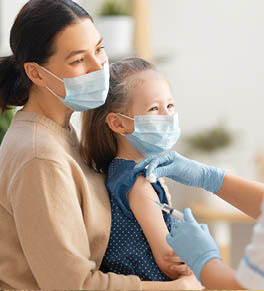How can my 5- to 11-year-old get the COVID-19 vaccine?

Now that the pediatric Pfizer vaccine has been approved for children ages 5 to 11, parents can easily schedule shots for their youngsters at UCI Health and elsewhere.
“We absolutely have both flu and COVID-19 vaccines available for all our pediatric patients of eligible age,” says UCI Health pediatrician Dr. Pei Lin Chang.
“We strongly recommend them — that’s really the long and the short of it. Like with every other vaccine we give, our goal is to protect both our patients and their family members.”
And, yes, it’s safe and recommended for kids to get both the COVID-19 and flu vaccinations at the same time, says Chang, who also is an assistant professor of pediatrics at the UCI School of Medicine.
How to get your child vaccinated
Here’s what parents need to know:
- The federal government is providing the COVID-19 vaccine free of charge to all people living in the United States, regardless of their immigration or health insurance status.
- Parents whose children are established UCI Health patients may schedule a nursing visit for the vaccine through MyChart or by contacting the doctor's office directly.
- For children not yet established as UCI Health patients, parents may contact UCI Health to schedule an appointment with Chang or another UCI Health pediatrician.
- The COVID-19 and flu vaccines also are available for eligible patients at most major pharmacies. Check their website beforehand to see if vaccination walk-ins or appointments are available for children.
- Visit the Orange County Health Care Agency for help finding a vaccine provider and the most up-to-date vaccine information for Orange County.
Facts about the pediatric Pfizer vaccine
Right now, the Pfizer-BioNTech COVID-19 vaccine, a two-shot series, is the only one approved for children in this age group. Nearly nine million U.S. children have received the vaccine as of December 2021, according to the U.S. Centers for Disease Control and Prevention.
- Clinical trials showed it to be 90.7% effective at preventing COVID-19 infections in this age group, according to the U.S. Food and Drug Administration.
- Two shots are given three weeks apart.
- The dosage is one-third the amount given to adults.
- Optimal protection begins about two weeks after the second shot.
- Side effects are typically mild and, like many vaccines, may include swelling and redness at the injection site, headache, body aches and low-grade fever.
Getting a vaccine reduces the chance of children ages 5 and older from spreading COVID-19 to others. It also helps protect the entire family, especially younger siblings who are not yet eligible to get the vaccine and others who are at increased risk of getting very sick.
Vaccination also allows kids to stay in school and safely participate in sports, playdates and other group activities.
Safe and effective
Chang says the COVID-19 vaccine has been in great demand for this age group and no serious complications have been reported.
“I’m happy to report that the majority of my eligible patients are getting the COVID-19 vaccine,” she says. “Most of the parents of my patients have not reported any major side effects.”
For parents concerned about the possibility of side effects, however, she suggests scheduling the vaccinations for a Friday and to avoid scheduling them before a big event for their child.
Flu and COVID-19 vaccines can be given in separate arms, if desired. But it’s not necessary. Chang says pediatricians often give more than one vaccination in one arm when multiple vaccines are required.
Because it takes two weeks for the vaccines to begin providing protection, Chang says it’s best if the series is completed as soon as possible, especially with the highly infectious omicron variant spreading rapidly.
While the vaccines are effective at preventing most infections, some fully vaccinated people are experiencing breakthrough cases of COVID-19. But their symptoms tend to be less severe and they are far less likely to be hospitalized or die than people who are unvaccinated, according to the CDC. However, most people who get COVID-19 are unvaccinated.
What about boosters for children?
For some immunocompromised children between the ages of 5 and 11, the CDC now recommends an additional booster dose of the Pfizer vaccine after the primary series, for a total of three doses.
For those aged 12 and older, the CDC advises giving a Pfizer booster shot five months after completion of the primary series of Pfizer COVID-19 vaccine.
“Schedule a booster shot for any older siblings as soon as they are eligible to keep your family’s level of protection at its highest as school and activities begin again,” Chang says.




